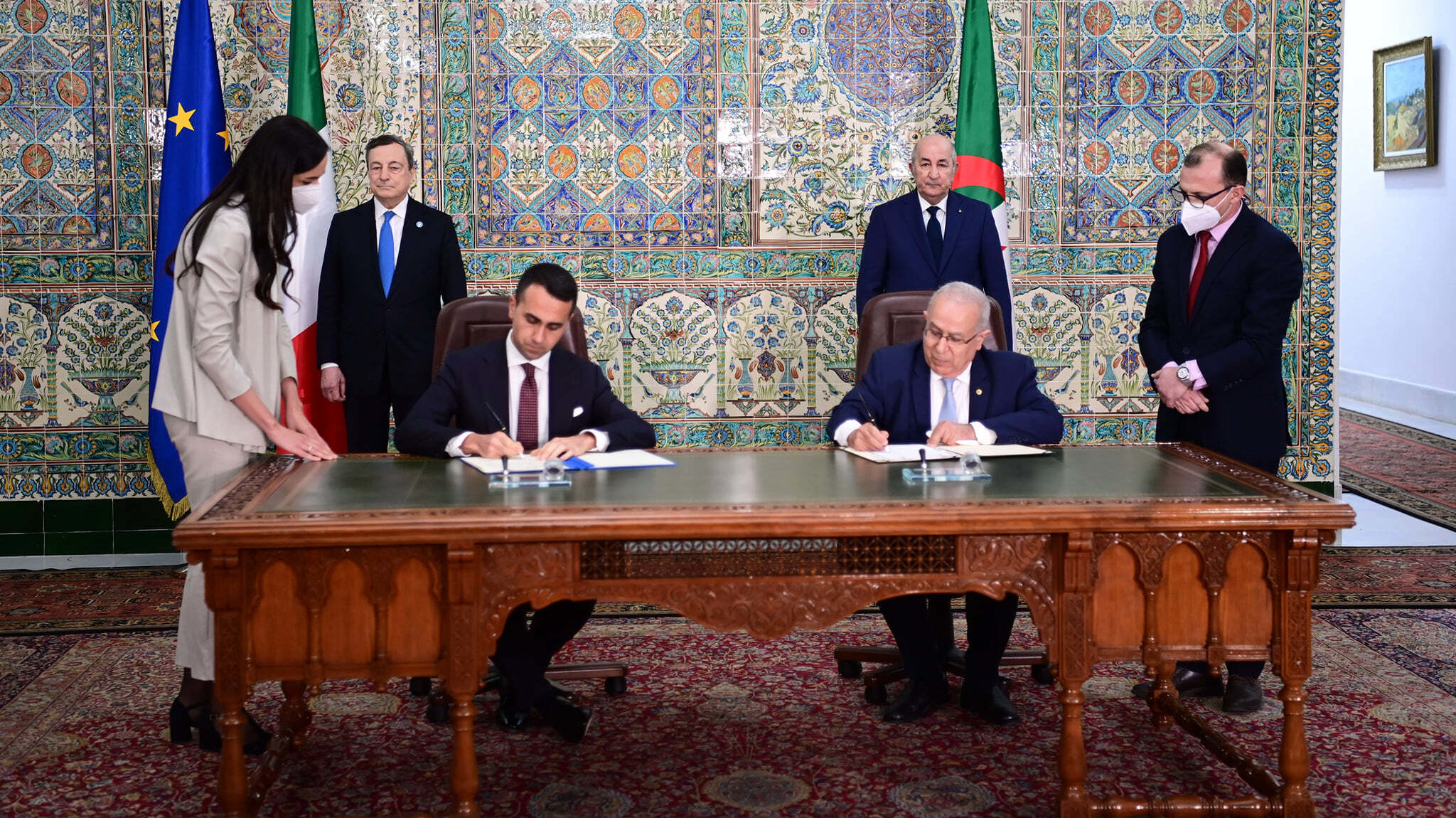Algeria, Italy Sign Gas Deal as Europe Looks To Wean Itself off Russian Energy
But Algiers-Rabat rivalry complicating Algerian exports
Algeria will increase its natural gas exports to Italy through a Mediterranean pipeline by 40%, Italian Prime Minister Mario Draghi announced on Monday.
The preliminary agreement is part of Europe’s effort to reduce its energy dependence on Russia, and others will follow, Algerian President Abdelmadjid Tebboune said following a meeting with the visiting Draghi in Algiers.
Stephen Blackwell, a political and security analyst who contributes to a wide range of regional publications, including The National newspaper in Abu Dhabi, told The Media Line that compared to the ongoing political fragmentation and conflict in Libya, Algeria can present itself as a reliable energy supplier.
Concerning Algeria, he explained, there was some speculation that it would be unwilling to meet Europe’s demand for increased gas supplies due to its close diplomatic and military links to Russia.
However, he added, “it looks like the prospect of increased energy revenues from Europe’s huge market was too good to resist.”
Europe will need to boost imports from a wide range of partners to make up for a cessation of supplies from Russia
But Amal Hamidallah, executive director of the Arab Gulf Foundation, told The Media Line, “While Europe might be ready for more Algerian gas as it looks to diversify its suppliers, Algeria’s current production capacity limits its ability to substantially increase export volumes to Europe.
“Any meaningful increases in Algerian production will require years of exploration and development and more crucially, further energy industry reforms to attract new investments,” she said.
Blackwell pointed out that Algeria could potentially supply up to 35 billion cubic meters (bcm) to Italy via the Trans-Mediterranean pipeline alone. But he noted that Russia supplied a total of 155 bcm to Europe last year.
“Europe will need to boost imports from a wide range of partners to make up for a cessation of supplies from Russia,” he added.
The pipeline runs from Algeria via Tunisia to Sicily and from there to mainland Italy.
Hamidallah added that Algerian energy consumption is increasing, which could also affect the country’s ability to export gas. Domestic demand has been surging because of a growing population, rising living standards, decadelong policies fueling domestic industries, and the all-important power sector becoming increasingly reliant on natural gas, she explained.
“The rise in exports and higher prices have helped Algeria weather economic hardship and defy dire forecasts about its economy and domestic stability. Still, Algeria is facing a dilemma between the need to address growing domestic gas needs and current export obligations, meeting its commitments to mainly Spain and Italy,” Hamidallah continued.
Algiers will not be able to take full advantage of its new status as an energy exporter until it resolves its differences with Morocco
Blackwell pointed to another important consideration, the complicated relations between Algeria and neighboring Morocco.
“Algiers will not be able to take full advantage of its new status as an energy exporter until it resolves its differences with Morocco,” he said.
Hamidallah added that Algeria and Morocco have been backing competing proposed pipelines to transport Nigerian gas to Europe.
She thinks that this could be a long-term opportunity for Europe to finally engage in the long-standing conflict between Algeria and Morocco, helping to find a constructive solution while both countries come to play a leading role in helping to connect Africa to Europe and beyond and even helping to stabilize Libya.
“Morocco and Algeria continue their efforts to advance these plans. Despite real challenges, the two countries see an opportunity in what might not have seemed, until now, as viable paths to transport African gas to Europe bringing much-needed investments to address the social demands of an increased population, but also peace and security to the region,” Hamidallah said.
Blackwell explained that the relations between the two countries have been frozen since October 2021, when a dispute over Rabat’s alleged interference in Algeria’s internal affairs, and Morocco’s recognition of Israel led to the closure of the Maghreb-Europe Gas Pipeline linking Algeria to Spain via Morocco.
Hamidallah believes it is important for “Algeria to accept Morocco’s historical links and rights in Western Sahara, allowing a peace agreement between the two North African powers.”
This way, “they could finally dedicate their resources to more urgent matters such as addressing climate change, water scarcity, unemployment, increasing population and diversifying their economies, acting in complement rather than in a continuous state of conflict that has drained all their resources,” she added.
An additional factor to consider, according to Hamidallah, is the Algerian need to address its internal bureaucratic deadlocks and secure more investment to boost its energy sector and infrastructure, while making the shift toward clean energy and reducing its consumption of gas.
Blackwell said that given the conflict in Ukraine, Europe urgently needs to diversify its energy sources. This process will take years, and North Africa will become increasingly important as pipeline infrastructure already exists there.
Hamidallah, however, pointed out that many governments in North Africa are trying to use renewable energy to address domestic needs, freeing up gas for export. But some countries, such as Algeria and Morocco, have not yet invested in renewable energy in any meaningful way, she said.


